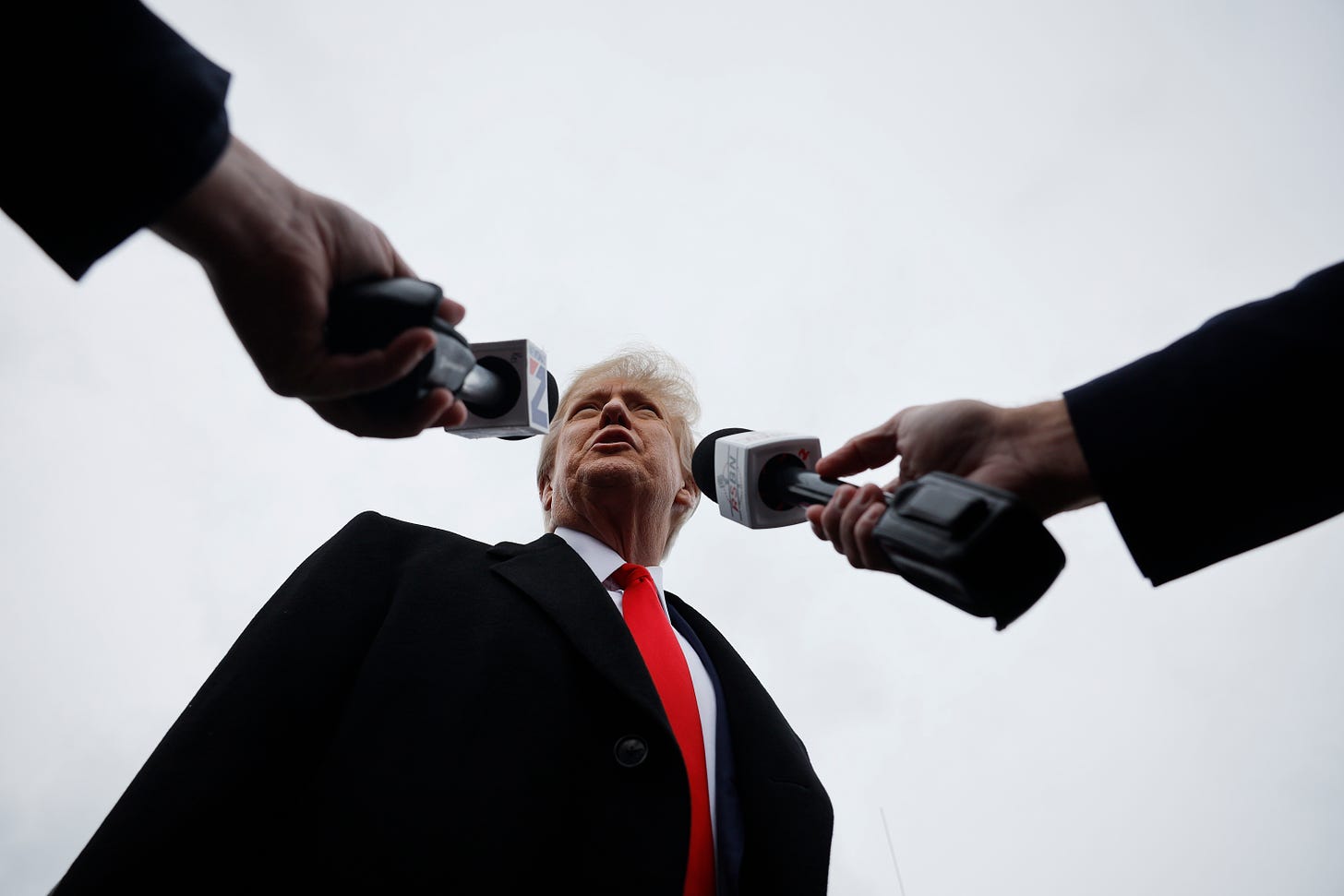
How Trump Will Make War Against the Media
Just a few of the tools he’ll have at his disposal once he returns to office.

THE PRESS, TO DONALD TRUMP, is the “enemy of the people.” Now that he will be president again, will he go after this enemy? The answer is almost certainly yes. He has nominated his ultra-loyal acolyte Kash Patel to run the Federal Bureau of Investigation. Patel has said of journalists who have purportedly treated Trump unfairly, “We’re going to come after you, whether it’s criminally or civilly—we’ll figure that out.” And Trump will have tools at his disposal with which to smash the fourth estate. It is worth reviewing what they are.
One powerful weapon is control of the Federal Communications Commission. As a Brookings Institution fellow recently noted, “as both candidate and president, Donald Trump has called for the FCC to revoke the licenses of ‘fake news’ media outlets, such as NBC and ABC.”
Could Trump actually do this?
In his first term in office, Trump’s own FCC appointees dismissed such a possibility. “I believe in the First Amendment,” stated then-FCC chairman Ajit Pai. “Under the law, the FCC does not have the authority to revoke a license of a broadcast station based on the content of a particular newscast.” This time around, Trump has selected a chairman, Brendan Carr, a contributor to Project 2025, who may interpret the FCC’s authorities more creatively. At the very least, attempts to punish broadcasters for their “fake news” would provoke major court battles. Will the Supreme Court prove resistant or compliant? It’s anyone’s guess.
The same Brookings paper notes that the Communications Act gives the president emergency powers over radio emissions and wired networks. And the president enjoys wide latitude to decide what constitutes a national emergency. During his first term in office, Trump interpreted the term liberally, making it a “favorite policy tool.”
Here is how the relevant part of the law reads:
(c) Upon proclamation by the President that there exists war or a threat of war, or a state of public peril or disaster or other national emergency . . . the President, if he deems it necessary in the interest of national security or defense, may suspend or amend, for such time as he may see fit, the rules and regulations applicable to any or all stations or devices capable of emitting electromagnetic radiations within the jurisdiction of the United States as prescribed by the Commission, and may cause the closing of any station for radio communication. . . .
Will Trump declare a national emergency and use the Communications Act to shutter stations of his choice? His nominations of individuals like Patel, Pete Hegseth, and Tulsi Gabbard (not to mention the dropout, Matt Gaetz) reveal that he intends to be a radical president, unconstrained by established norms and willing to push the law to the limits if not beyond them.
So when it comes to abusive governmental control of the airwaves, stay tuned.
ANOTHER POWERFUL WEAPON in Trump’s arsenal will be the espionage statutes. While they serve the legitimate purpose of protecting the nation’s secrets, they are drawn in a way that can capture journalists in their web.
As is well known, the U.S. government massively overclassifies information about its national defense activities. In the normal course of American journalism, the publication of such formally secret information is an everyday affair. Though the Justice Department has in recent years vigorously prosecuted leakers inside government who have passed classified information to journalists, it has left journalists themselves untouched. A singular exception involves WikiLeaks proprietor Julian Assange who finally, this past June, after a multiyear ordeal, pleaded guilty to conspiracy to obtain and disclose national defense information, a violation of the Espionage Act of 1917.
Assange is an unsavory character with links to Russian intelligence. But no matter: A precedent has been set. The Trump Justice Department could readily pursue similar cases against national security journalists whom they disfavor.
In this regard, the Pentagon Papers case, the most celebrated leak in American history, is a cautionary tale. The Supreme Court ruled in 1971 that the Nixon administration could not obtain prior restraint to stop the New York Times from publishing the massive study of the Vietnam War that Daniel Ellsberg had stolen and given to the Times and the Washington Post. But a majority of the justices held that if the case came back to the high court after the fact, as a prosecution of the New York Times for its publication of government secrets in violation of the espionage statutes, they might well vote to convict.
Reviewing the legislative history of the Espionage Act, Justice Byron White noted in a concurring opinion that Congress “appeared to have little doubt that newspapers would be subject to criminal prosecution if they insisted on publishing information of the type Congress had itself determined should not be revealed.” White added this warning to the New York Times and the other newspapers in the case: National-defense information is protected from disclosure by a variety of statutes, so
if any of the material here at issue is of this nature, the newspapers are presumably now on full notice of the position of the United States, and must face the consequences if they publish. I would have no difficulty in sustaining convictions under these sections [of the relevant statutes] on facts that would not justify . . . the imposition of a prior restraint.
This, too, is a precedent that the Trump Justice Department, led by an Attorney General Pam Bondi, might well deploy again and again. And today’s Roberts Court might be even more willing than the Burger Court to uphold prosecutions of journalists for publishing government secrets.
FINALLY, THE BRANZBURG PRECEDENT has far-reaching implications for the future of journalism under a second Trump presidency. Journalists routinely promise confidentiality to their sources. That promise is essential to the process of obtaining newsworthy information. But the question that came before the Supreme Court In Branzburg v. Hayes (1972) was whether a grand jury, in investigating drug crimes, could compel a journalist to disclose the identity of confidential sources who may have committed crimes. The Court answered in the affirmative, declaring, “we cannot seriously entertain the notion that the First Amendment protects a newsman’s agreement to conceal the criminal conduct of his source, or evidence thereof, on the theory that it is better to write about crime than to do something about it.”
In the years since Branzburg, the power to compel journalists to disclose their sources has been used exceedingly sparingly. The most celebrated, or notorious, case was that of Judith Miller, who refused to comply with the grand jury’s demands that she reveal her source in the Valerie Plame imbroglio. Miller was held in contempt of court and spent eighty-five days in jail.
There is no law stopping a malevolent Justice Department from making a practice that has been rare into a practice that is routine. If, say, a grand jury were investigating a leak from the second Trump administration, federal prosecutors could have a grand jury summon the journalist who published the leak and attempt to compel him or her to talk. Acquiescence to such a demand would gravely damage the future ability of journalists to persuade sources to provide information. Refusal could result in a lengthy spell in jail à la Judith Miller.
Steve Bannon has warned that journalists and journalistic organizations had better “lawyer up” as the Trump Justice Department would be coming for them. It is a warning that must be taken seriously. With a series of extreme appointments, the architecture of authoritarianism is being constructed before our eyes. Eviscerating the First Amendment will be a key part of that effort. When it comes to freedom of the press in the second Trump term, we are facing a five-alarm fire.
















